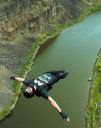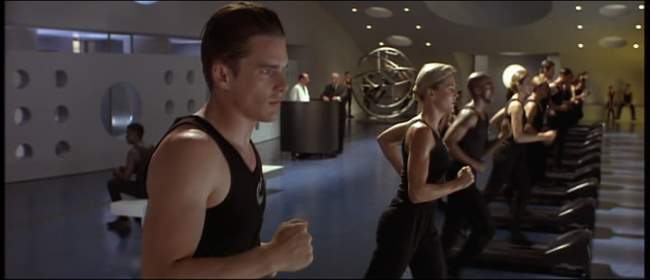The following blog post finished 5th in our recent contest for a free autographed copy of our Heroes book. Each week we will post another hero profile in the top 5. Congratulations to all five of these excellent entries. — Scott Allison and George Goethals

By Geoff McQuilkin
Desperate Heroes feel as though they have nothing to lose, but everything to gain. They are not martyrs in a sense that they want to die for a cause, but they would rather risk losing everything if it meant being able to gain something significant. When backed into a corner with a ubiquitous sense of despair, these characters emerge with a driven, almost manic focus to defy their oppression and live on despite their troubled circumstances.
Jeb Corliss is a modern day example of such a hero. Abandoned by his mother at the age of fifteen, Corliss dropped out of school in sixth grade. In an interview with Men's Journal, Corliss stated that "[school] was a place to go fight€¦it made me a very dark, unhappy person." He suffered through severe depression throughout adolescence until he discovered skydiving at the age of 18. After his first dive, Corliss became addicted to the adrenaline rush that accompanied the intense sensation of freefall. He began to attempt more and more dangerous stunts in the realm of skydiving and base-jumping. In an otherwise hopeless world, Corliss decided that he was either going to achieve greatness in his newfound passion, or die in his attempts.
Now, at the age of 34, Corliss has become one of the world's most famous extreme athletes, having illegally jumped off of some of the most recognizable structures in the world (The Eifel Tower, The Empire State Building, The Golden Gate Bridge, The Petronas Towers, The Stratosphere Casino€¦etc.). His next major project is building a $2 million ramp that he will use as a gradual landing structure so that he can successfully jump out of a plane without a parachute. Jeb Corliss might not be every mother's favorite role model for their children, but his story of overcoming his depression and awing the world with his stunts is a great boon for those who have weathered the dismal years of adolescence.
Another prime example of the desperate hero can be found in the movie Gattaca.  Ethan Hawke plays the role of Vincent Freeman, a man who is considered by his futuristic society to be slightly subhuman because he was born without the aid of liberal eugenics, which is used at birth to optimize children and rid them of any physical, intellectual or psychological dysfunction. Because Freeman is less than perfect, he is considered ineligible to fulfill his dream of traveling into space. After realizing that he would rather be dead than continue to live as a subordinate, Freeman goes through the grueling task of impersonating an elite member of society. After a number of near fatal setbacks, the hero miraculously boards a shuttle and launches into space.
Ethan Hawke plays the role of Vincent Freeman, a man who is considered by his futuristic society to be slightly subhuman because he was born without the aid of liberal eugenics, which is used at birth to optimize children and rid them of any physical, intellectual or psychological dysfunction. Because Freeman is less than perfect, he is considered ineligible to fulfill his dream of traveling into space. After realizing that he would rather be dead than continue to live as a subordinate, Freeman goes through the grueling task of impersonating an elite member of society. After a number of near fatal setbacks, the hero miraculously boards a shuttle and launches into space.
This triumph of the human spirit over seemingly insurmountable odds is a classic hero story. However, the fervent desperation that gives life to these heroes warrants the creation of a new subcategory of heroism. At a few points throughout Gattaca, Vincent and his brother, Anton (who is a member of the genetically superior class), play a game where they see how far they can swim out into the ocean, knowing that they will have to swim back to shore. Anton is astounded that his weaker brother always wins. At a defining moment in the movie, Anton asks his brother how he was always able to beat him. Vincent smiles at his brother and says, "I never saved anything for the swim back."
Below is a clip from Gattaca.
[kml_flashembed movie="http://www.youtube.com/v/hZKZSiCmXLQ" width="425" height="350" wmode="transparent" /]
Like this:
Like Loading...

